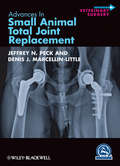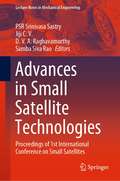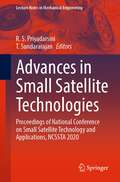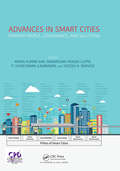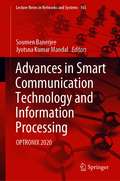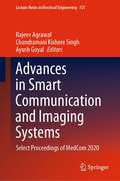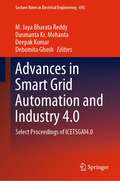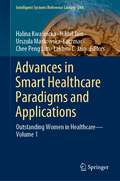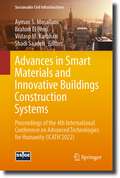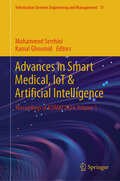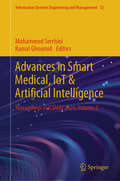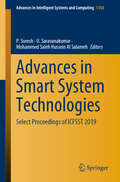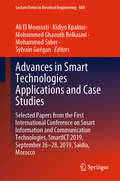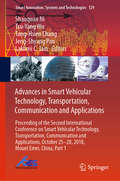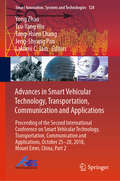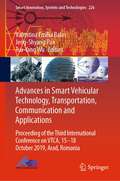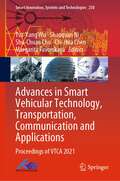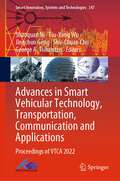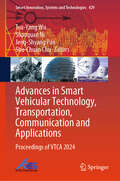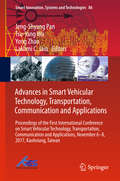- Table View
- List View
Advances in Small Animal Total Joint Replacement
by Denis J. Marcellin-Little Jeffrey N. PeckAdvances in Small Animal Total Joint Replacement provides an up-to-date, comprehensive examination of joint replacement in veterinary surgery. Part of the Advances in Veterinary Surgery series copublished with the ACVS Foundation, the book presents an evidence-based, multi-system examination of the current state of hip, knee, and elbow replacement in dogs and cats, including information on biomechanics and biomaterials not found in other sources. Written by an international group of experts, the book offers guidance on the history, indications, contraindications, clinical procedures, and a review of the current literature for these surgical techniques.Focusing on replacement of the hip, knee, and elbow, the book also covers disc, shoulder, carpus, and tarsus replacement, as well as information on the development of custom prostheses. Each section incorporates information on potential complications and outcomes assessment. Advances in Small Animal Total Joint Replacement is an unparalleled repository of information for veterinary surgeons, residents, and practitioners with an interest in these procedures.
Advances in Small Satellite Technologies: Proceedings of 1st International Conference on Small Satellites (Lecture Notes in Mechanical Engineering)
by Psr Srinivasa Sastry Jiji C. V. D. V. A. Raghavamurthy Samba Siva RaoThis volume contains select papers presented during the 1st International Conference on Small Satellites, discussing the latest research and developments relating to small satellite technology. The papers cover various issues relating to design and engineering, ranging from the control, mechanical and thermal systems to the sensors, antennas and RF systems used. The volume will be of interest to scientists and engineers working on or utilizing satellite and space technologies.
Advances in Small Satellite Technologies: Proceedings of National Conference on Small Satellite Technology and Applications, NCSSTA 2020 (Lecture Notes in Mechanical Engineering)
by R. S. Priyadarsini T. SundararajanThis book contains select papers presented during the 2nd National Conference on Small Satellites, discussing the latest research and developments relating to small satellite technology. The papers cover various issues relating to design and engineering, ranging from the control, mechanical, and thermal systems to the sensors, antennas, and RF systems used. The book is of interest to scientists and engineers working on or utilizing satellite and space technologies.
Advances in Smart Cities: Smarter People, Governance, and Solutions
by Yogesh K. Dwivedi Arpan Kumar Kar P. Vigneswara Ilavarasan M P GuptaThis is an edited book based on the selected submissions made to the conference titled "International Conference in Smart Cities". The project provides an innovative and new approach to holistic management of cities physical, socio-economic, environmental, transportation and political assets across all domains, typically supported by ICT and open data.
Advances in Smart Communication Technology and Information Processing: OPTRONIX 2020 (Lecture Notes in Networks and Systems #165)
by Jyotsna Kumar Mandal Soumen BanerjeeThis book is a collection of best selected research papers presented at the 6th International Conference on Opto-Electronics and Applied Optics (OPTRONIX 2020) organized by the University of Engineering & Management, Kolkata, India, in June 2020. The primary focus is to address issues and developments in optoelectronics with particular emphasis on communication technology, IoT and intelligent systems, information processing and its different kinds. The theme of the book is in alignment with the theme of the conference “Advances in Smart Communication Technology and Information Processing.” The purpose of this book is to inform the scientists and researchers of this field in India and abroad about the latest developments in the relevant field and to raise awareness among the academic fraternity to get them involved in different activities in the years ahead – an effort to realize knowledge-based society.
Advances in Smart Communication and Imaging Systems: Select Proceedings of MedCom 2020 (Lecture Notes in Electrical Engineering #721)
by Rajeev Agrawal Chandramani Kishore Singh Ayush GoyalThis book presents select and peer-reviewed proceedings of the International Conference on Smart Communication and Imaging Systems (MedCom 2020). The contents explore the recent technological advances in the field of next generation communication systems and latest techniques for image processing, analysis and their related applications. The topics include design and development of smart, secure and reliable future communication networks; satellite, radar and microwave techniques for intelligent communication. The book also covers methods and applications of GIS and remote sensing; medical image analysis and its applications in smart health. This book can be useful for students, researchers and professionals working in the field of communication systems and image processing.
Advances in Smart Energy Systems (Smart Innovation, Systems and Technologies #301)
by Valentina Emilia Balas Ripon Patgiri Biplab DasThis book discusses smart computing techniques which offer an effective solution for investigating and modeling the stochastic behavior of renewable energy generation, operation of grid-connected renewable energy systems, and smart decision-making among alternatives. It also discusses applications of soft computing techniques to make an intelligent decision for optimum use of suitable alternatives which gives an upper hand compared to conventional systems. It includes upgradation of the existing system by embedding of machine intelligence. The authors present combination of use of neutral networks, fuzzy systems, and genetic algorithms which are illustrated in several applications including forecasting, security, verification, diagnostics of a specific fault, efficiency optimization, etc. Smart energy systems integrate a holistic approach in diverse sectors including electricity, thermal comfort, power industry, transportation. It allows affordable and sustainable solutions to solve the future energy demands with suitable alternatives. Thus, contributions regarding integration of the machine intelligence with the energy system, for efficient collection and effective utilization of the available energy sources, are useful for further advanced studies.
Advances in Smart Grid Automation and Industry 4.0: Select Proceedings of ICETSGAI4.0 (Lecture Notes in Electrical Engineering #693)
by Deepak Kumar M. Jaya Bharata Reddy Dusmanta Kr. Mohanta Debomita GhoshThis book comprises select proceedings of the International Conference on Emerging Trends for Smart Grid Automation and Industry 4.0 (ICETSGAI4.0 2019). The contents discuss the recent trends in smart grid technology and related applications. The topics covered include data analytics for smart grid operation and control, integrated power generation technologies, green technologies as well as advances in microgrid operation and planning. The book highlights the enhancement in technology in the field of smart grids, and how IoT, big data, robotics and automation, artificial intelligence, and wide area measurement have become prerequisites for the fourth industrial revolution, also known as Industry 4.0. The book can be a valuable reference for researchers and professionals interested in smart grid automation incorporating features of Industry 4.0.
Advances in Smart Grid Technology: Select Proceedings of PECCON 2019—Volume I (Lecture Notes in Electrical Engineering #687)
by Pierluigi Siano K. JamunaThis book comprises the select proceedings of the International Conference on Power Engineering Computing and Control (PECCON) 2019. This volume focuses on the different renewable energy sources which are integrated in a smart grid and their operation both in the grid connected mode and islanded mode. The contents highlight the role of power converters in the smart grid environment, battery management, electric vehicular technology and electric charging station as a load for the power network. This book can be useful for beginners, researchers as well as professionals interested in the area of smart grid technology.
Advances in Smart Grid Technology: Select Proceedings of PECCON 2019—Volume II (Lecture Notes in Electrical Engineering #688)
by Ning Zhou S. HemamaliniThis book comprises the select proceedings of the International Conference on Power Engineering Computing and Control (PECCON) 2019. This volume covers several important topics such as optimal data selection and error-free data acquiring via artificial intelligence and machine learning techniques, information and communication technologies for monitoring and control of smart grid components, and data security in smart grid network. In addition, it also focuses on economics of renewable electricity generation, policies for distributed generation, smart eco-structures and systems. This book can be useful for beginners, researchers as well as professionals interested in the area of smart grid technology.
Advances in Smart Grid and Renewable Energy: Proceedings of ETAEERE-2016 (Lecture Notes in Electrical Engineering #435)
by Sabyasachi Sengupta Ahmed F. Zobaa Karma Sonam Sherpa Akash Kumar BhoiThis volume comprises select proceedings of ETAEERE-2016. The volume offers state-of-the-art chapters on energy management systems (EMS), renewable energy resources, micro-generation, green communications architectures and frameworks, green computing and education as well as energy-aware process optimization. The contents covers a wide variety of topics and aspects including management of renewable energy systems and environmental challenges. The contents of this volume will be useful to researchers and practicing engineers working in the areas of smart grids and renewable energy generation, distribution, and management.
Advances in Smart Grid and Renewable Energy: Select Proceedings of ETAEERE 2020 (Lecture Notes in Electrical Engineering #691)
by Karma Sonam Sherpa Akash Kumar Bhoi Akhtar Kalam Manoj Kumar MishraThis book comprises select proceedings of the international conference ETAEERE 2020, and primarily focuses on renewable energy resources and smart grid technologies. The book provides valuable information on the technology and design of power grid integration on microgrids of green energy sources. Some of the topics covered include solar PV array, hybrid microgrid, daylight harvesting, green computing, photovoltaic applications, nanogrid applications, AC/DC/AC converter for wind energy systems, solar photovoltaic panels, PEM fuel cell system, and biogas run dual-fueled diesel engine. The contents of this book will be useful for researchers and practitioners working in the areas of smart grids and renewable energy generation, distribution, and management.
Advances in Smart Healthcare Paradigms and Applications: Outstanding Women in Healthcare—Volume 1 (Intelligent Systems Reference Library #244)
by Lakhmi C. Jain Chee Peng Lim Halina Kwaśnicka Nikhil Jain Urszula Markowska-KaczmarThis book is dedicated to showcase research and innovation in smart healthcare systems and technologies led by women scientists, researchers, and practitioners. With the advent of artificial intelligence (AI) and related technologies, the healthcare sector has undergone tremendous changes in practice and management in recent years. On par to men, women have made significant contributions to tackle a variety of healthcare problems, creating smarter paradigms to provide effective and efficient solutions for patients and stakeholders. The book presents a small collection of contributions by outstanding women in STEM (Science, Technology, Engineering and Mathematics) education, focusing on the healthcare domain. The selected articles allow readers to comprehend current advances in AI and other methods for undertaking healthcare challenges. It is envisaged that the inspiring work by prominent women scientists, researchers, and practitioners reported in this book offers a beacon to propel women in pursuing STEM education and advancing the healthcare sector for the benefits of humankind.
Advances in Smart Materials and Innovative Buildings Construction Systems: Proceedings of the 4th International Conference on Advanced Technologies for Humanity (ICATH'2022) (Sustainable Civil Infrastructures)
by Brahim El Bhiri Ayman S. Mosallam Vistasp M. Karbhari Shadi SaadehThis book contains a comprehensive guide to the latest developments in building and bridge construction. The book covers a wide range of topics, including the use of advanced materials such as fiber-reinforced polymer (FRP) composites and the incorporation of smart technologies into design and construction of buildings and bridges.The book discusses advantages of using FRP composites in building and bridge construction. It then goes on to explore the use of smart technologies, such as sensors and structural health monitoring systems, to improve performance and safety of structures. It also covers the use of advanced concrete and masonry materials and methods, including high-performance concrete, self-consolidating concrete, and advanced masonry systems.The book is written for engineers, architects, and construction professionals and provides a detailed overview of the latest research and developments in the field. It includes case studies and practical examples to illustrate key concepts and techniques, making it an invaluable resource for those involved in building and bridge construction. With its comprehensive coverage of the latest advances in building and bridge construction, "Advances in Concrete, Masonry and FRP Composite Smart Buildings and Bridges" is an essential guide for anyone looking to stay current with the latest trends and technologies in the industry.
Advances in Smart Medical, IoT & Artificial Intelligence: Proceedings of ICSMAI'2024, Volume 1 (Information Systems Engineering and Management #11)
by Mohammed Serrhini Kamal GhoumidThis comprehensive book brings together the brightest minds in academic, featuring a curated selection of papers and presentations from the esteemed conference. With a focus on the intersection of the conference themes, this book provides a unique platform for researchers, practitioners, and innovators to share their cutting-edge research, innovations, and solutions. Get ready to dive into the latest advancements in Artificial Intelligence and Internet of Things for Healthcare, Computer Vision, world of computer science, featuring advancements in machine learning, natural language processing, and more with the Proceedings of SMAI2024. This book presents a comprehensive and interdisciplinary examination of the applications, challenges, and implications of AI-IoT convergence in different contexts such Smart Healthcare/Smart Technologies/Smart Industry, computer vision, and NLP. Through a series of erudite chapters, esteemed experts in computer sciences, healthcare, physics, technology, and research domains provide authoritative insights into the transformative potential of this synergy. As editors, we are proud to present a curated collection of contributions that reflect the latest research findings, innovations, and best practices in IA technology. The editors’ objective is to provide a nuanced and authoritative exploration of the AI-IoT nexus, with the aim of inspiring further research, collaboration, and innovation in the pursuit of excellence in Artificial Intelligence.
Advances in Smart Medical, IoT & Artificial Intelligence: Proceedings of ICSMAI'2024, Volume 2 (Information Systems Engineering and Management #12)
by Mohammed Serrhini Kamal GhoumidThis comprehensive book brings together the brightest minds in academic, featuring a curated selection of papers and presentations from the esteemed conference. With a focus on the intersection of the conference themes, this book provides a unique platform for researchers, practitioners, and innovators to share their cutting-edge research, innovations, and solutions. Get ready to dive into the latest advancements in Artificial Intelligence and Internet of Things for Healthcare, Computer Vision, world of computer science, featuring advancements in machine learning, natural language processing, and more with the Proceedings of SMAI2024. This book presents a comprehensive and interdisciplinary examination of the applications, challenges, and implications of AI-IoT convergence in different contexts such Smart Healthcare/Smart Technologies/Smart Industry, computer vision, and NLP. Through a series of erudite chapters, esteemed experts in computer sciences, healthcare, physics, technology, and research domains provide authoritative insights into the transformative potential of this synergy. As editors, we are proud to present a curated collection of contributions that reflect the latest research findings, innovations, and best practices in IA technology. The editors’ objective is to provide a nuanced and authoritative exploration of the AI-IoT nexus, with the aim of inspiring further research, collaboration, and innovation in the pursuit of excellence in Artificial Intelligence.
Advances in Smart System Technologies: Select Proceedings of ICFSST 2019 (Advances in Intelligent Systems and Computing #1163)
by P. Suresh U. Saravanakumar Mohammed Saleh Hussein Al SalamehThis book presents select peer-reviewed proceedings of the International Conference on Frontiers in Smart Systems Technologies (ICFSST 2019). It focuses on latest research and cutting-edge technologies in smart systems and intelligent autonomous systems with advanced functionality. Comprising topics related to diverse aspects of smart technologies such as high security, reliability, miniaturization, energy consumption, and intelligent data processing, the book contains contributions from academics as well as industry. Given the range of the topics covered, this book will prove useful for students, researchers, and professionals alike.
Advances in Smart Technologies Applications and Case Studies: Selected Papers from the First International Conference on Smart Information and Communication Technologies, SmartICT 2019, September 26-28, 2019, Saidia, Morocco (Lecture Notes in Electrical Engineering #684)
by Ali El Moussati Kidiyo Kpalma Mohammed Ghaouth Belkasmi Mohammed Saber Sylvain GuéganThis book offers a comprehensive snapshot of practically-relevant developments in the field of smart information technologies. Including selected papers presented at the First International Conference on Smart Information and Communication Technologies, SmartICT 2019, held on September 26-28, in 2019, Saidia, Morocco, it reports on practical findings, and includes useful tutorials concerning current technologies and suggestions to improve them. It covers a wide range of applications, from health and energy management, to digital education, agriculture and cybersecurity, providing readers with a source of new ideas for future research and collaborations.
Advances in Smart Vehicular Technology, Transportation, Communication and Applications: Proceeding of the Second International Conference on Smart Vehicular Technology, Transportation, Communication and Applications, October 25-28, 2018 Mount Emei, China, Part 1 (Smart Innovation, Systems and Technologies #129)
by Lakhmi C. Jain Jeng-Shyang Pan Tsu-Yang Wu Shaoquan Ni Tang-Hsien ChangThis book highlights papers presented at the Second International Conference on Smart Vehicular Technology, Transportation, Communication and Applications (VTCA 2018), which was held at Mount Emei, Sichuan Province, China from 25 to 28 October 2018. The conference was co-sponsored by Springer, Southwest Jiaotong University, Fujian University of Technology, Chang’an University, Shandong University of Science and Technology, Fujian Provincial Key Lab of Big Data Mining and Applications, and the National Demonstration Center for Experimental Electronic Information and Electrical Technology Education (Fujian University of Technology). The conference was intended as an international forum for researchers and professionals engaged in all areas of smart vehicular technology, vehicular transportation, vehicular communication, and applications.
Advances in Smart Vehicular Technology, Transportation, Communication and Applications: Proceeding of the Second International Conference on Smart Vehicular Technology, Transportation, Communication and Applications, October 25-28, 2018 Mount Emei, China, Part 2 (Smart Innovation, Systems and Technologies #128)
by Lakhmi C. Jain Jeng-Shyang Pan Yong Zhao Tsu-Yang Wu Tang-Hsien ChangThis book highlights papers presented at the Second International Conference on Smart Vehicular Technology, Transportation, Communication and Applications (VTCA 2018), which was held at Mount Emei, Sichuan Province, China from 25 to 28 October 2018. The conference was co-sponsored by Springer, Southwest Jiaotong University, Fujian University of Technology, Chang’an University, Shandong University of Science and Technology, Fujian Provincial Key Lab of Big Data Mining and Applications, and the National Demonstration Center for Experimental Electronic Information and Electrical Technology Education (Fujian University of Technology). The conference was intended as an international forum for researchers and professionals engaged in all areas of smart vehicular technology, vehicular transportation, vehicular communication, and applications.
Advances in Smart Vehicular Technology, Transportation, Communication and Applications: Proceeding of the Third International Conference on VTCA, 15–18 October 2019, Arad, Romania (Smart Innovation, Systems and Technologies #226)
by Jeng-Shyang Pan Valentina Emilia Balas Tsu-Yang WuThis book constitutes the Proceedings of The Third International Conference on Smart Vehicular Technology, Transportation, Communication and Applications (VTCA 2019), Arad, Romania, held on October 15–18 October 2019 in Arad, Romania. This edition is technically co-sponsored by “Aurel Vlaicu” University of Arad, Romania, Southwest Jiaotong University, Fujian University of Technology, Chang’an University, Shandong University of Science and Technology, Fujian Provincial Key Lab of Big Data Mining and Applications, and National Demonstration Center for Experimental Electronic Information and Electrical Technology Education (Fujian University of Technology), China, Romanian Academy and General Association of Engineers in Romania - Arad Section. The book covers a range of topics including algorithms for optimization, video processing, parking management, IoT, software testing, cryptanalysis, NLP, CNN, wireless sensors network, adaptive security, data protection, green transportation, AI, smart cities, train control, analytic hierarchy process, big data, car following model, etc. The books help to disseminate the knowledge about some active research directions in the field Vehicle Technology and Communication. The book provides useful information to professors, researchers and graduated students in area of Vehicle Technology and Communication.
Advances in Smart Vehicular Technology, Transportation, Communication and Applications: Proceedings of VTCA 2021 (Smart Innovation, Systems and Technologies #250)
by Shu-Chuan Chu Margarita Favorskaya Tsu-Yang Wu Shaoquan Ni Chi-Hua ChenThis book includes selected papers from the fourth International Conference on Smart Vehicular Technology, Transportation, Communication and Applications (VTCA 2021), held in Chengdu City, Sichuan Province, China, during May 22–24, 2021. The conference is technically co-sponsored by Southwest Jiaotong University, Shandong University of Science and Technology, Fujian University of Technology, and Minjiang University. The book includes research works from engineers, researchers, and practitioners interested in the advances and applications in the field of vehicle technology and communication. The book covers four tracks, namely (1) vehicular networking security, (2) vehicular electronics, (3) intelligent transportation systems, and (4) smart vehicular communication networks and telematics.
Advances in Smart Vehicular Technology, Transportation, Communication and Applications: Proceedings of VTCA 2022 (Smart Innovation, Systems and Technologies #347)
by George A. Tsihrintzis Shu-Chuan Chu Tsu-Yang Wu Shaoquan Ni Jingchun GengThis book includes selected papers from the fifth International Conference on Smart Vehicular Technology, Transportation, Communication and Applications (VTCA 2022), held in online mode during December 24–26, 2022. The book includes research works from engineers, researchers, and practitioners interested in the advances and applications in the field of vehicle technology and communication. The book covers four tracks, namely (1) vehicular networking security, (2) vehicular electronics, (3) intelligent transportation systems and applications, and (4) smart vehicular communication networks and telematics.
Advances in Smart Vehicular Technology, Transportation, Communication and Applications: Proceedings of VTCA 2024 (Smart Innovation, Systems and Technologies #429)
by Jeng-Shyang Pan Shu-Chuan Chu Tsu-Yang Wu Shaoquan NiThis book includes selected papers from the sixth International Conference on Smart Vehicular Technology, Transportation, Communication, and Applications (VTCA 2024), hosted by Shu-Te University and Taiwan Association for Web Intelligence Consortium, and is technically sponsored by National Kaohsiung University of Science and Technology and Nanchang Institute of Technology, during April 16–18, 2024. The book includes research works from engineers, researchers, and practitioners interested in the advances and applications in the field of vehicle technology and communication. The book covers three tracks, namely (1) vehicular electronics, (2) intelligent transportation systems and applications, and (3) vehicular networking security.
Advances in Smart Vehicular Technology, Transportation, Communication and Applications: Proceedings of the First International Conference on Smart Vehicular Technology, Transportation, Communication and Applications, November 6-8, 2017, Kaohsiung, Taiwan (Smart Innovation, Systems and Technologies #86)
by Lakhmi C. Jain Jeng-Shyang Pan Yong Zhao Tsu-Yang WuThis book presents papers from the First International Conference on Smart Vehicular Technology, Transportation, Communication and Applications (VTCA 2017). Held from 6 to 8 November 2017 in Kaohsiung, Taiwan, the conference was co-sponsored by Springer, Fujian University of Technology in China, Fujian Provincial Key Laboratory of Digital Equipment, Fujian Provincial Key Lab of Big Data Mining and Applications, and National Kaohsiung University of Applied Sciences in Taiwan. The book is a valuable resource for researchers and professionals engaged in all areas of smart vehicular technology, vehicular transportation, vehicular communication, and applications.
